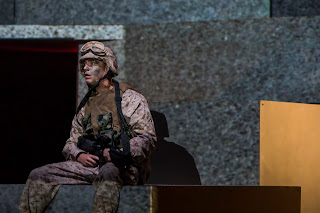The Atlanta Opera: You’re back in Atlanta! Any new finds since you were last here in September?
Vita and David: We've been working on the show 12-16 hours a day most days, so we haven't had much time to explore Atlanta, but when we got the chance, we'd sneak off to K1 Speed and race electric karts! Other favorites are Octane Coffee, Moe's Original Bar B Que, Bone Garden Cantina, and a memorable dinner at the Piedmont Driving Club.
David - You sang the world premiere of Soldier Songs and some of your vocals are used in this production. What’s it like to hear yourself in this production? And to work with your own voice?
 |
| Photo Ben Raftermen |
GLMMR designed Winter Journey with the Opera in September. How has your design and production approach differed or remained the same with Soldier Songs?
Vita: The main difference in our process for the two productions is that David and I directed and designed Winterreise, then David performed it, whereas in Soldier Songs, we collaborated with Tomer Zvulun (director) and Matthew Worth (baritone) to create the piece. From a design stand point, we always start with the core - the story - and develop the production from there using whichever resources are available to us for that project. During Winterreise, David stepped away from the technical side of things during the final week in order to concentrate on rehearsing and performing, while Maxwell Bowman, our lighting designer and video tech, took over both lighting and video.
You are working many elements into Soldier Songs that are atypical to opera productions, like projections and pre-recorded audio. Can you tell us more about that?
 |
| Photo: Ben Raftermen |
Opera has historically been one of the richest, most versatile, and most technologically advanced performance mediums in Western culture, so it's important that we continue the tradition of enhancing this venerable art form with the newest technology available. As with many of GLMMR's other shows, we're using a video projection technique called "3D projection mapping," in which the video projector's output is conformed precisely to the scenery, as opposed to being restricted to a flat screen. For Soldier Songs, though, we decided to incorporate a new, more complex 3D projection mapping technique that we're not even sure has been used in opera before. In this method, the set is modeled in 3D architectural software, then a "skin" of video is placed over that model in 3D video software - this allows us to introduce elements such as virtual lighting/shadow effects and geometrically precise mapping effects before the video files even reach the projector. We also used a new technique of scenic projection surfacing that allowed us to coat the set with a dark grey paint mixture that is almost as reflective as a white surface, but with superior contrast. This required a lot of research and experimentation on our part, but we found a formula that works, and we look forward to keeping it in our bag of tricks for future productions.
 |
| Photo: Ben Raftermen |
The pre-recorded audio is a component of the published score for Soldier Songs, and is used in all of its productions. Aside from David's narration, we didn't have a hand in creating the soundscapes - they were created by David T. Little, but we created video sequences to go along with them and developed a way for the audio clips to be synchronized with the video clips during live performance.
One part of the performance includes actual footage shot from an Abrams tank. How do you curate this (mountain of) content to add to the story being shared on stage?
We work a lot in the filmmaking and photography worlds, so we prefer to shoot as much of our content as we can. However, this wasn't an option with military and wartime footage, so we spent months sourcing imagery, carefully going through it, curating and editing it, then distilling what will be shown on stage to only the most essential elements that will drive the story forward. It's not easy, as we go to great lengths to avoid using copyrighted material or altering and presenting it to abide by Fair Use guidelines. The pre-show photo sequence in Soldier Songs is comprised of photos submitted by Atlanta area Vietnam veterans. This was Tomer's idea, and we were honored and thrilled that the veterans were willing to participate in that way.
David T. Little (composer) was inspired by the compositions of Danny Elfman. Who or What inspires your work?
In this case, our biggest inspiration came from the combat veterans of all nations who have risked, offered, or gave their lives in service to their country. www.woundedwarriorproject.org
Are you able to improvise in these types of productions?
Not in opera, for the most part - there are too many elements that must be in lock-step with one another so that the drama can move forward. The use of video is more flexible than conventional scenery, as it can be manipulated to a great degree during technical rehearsals. However, complex video sequences take a lot of time to plan, produce, and render, so while the flexibility is there, it isn't infinite. While the creative process includes some improvisation, everything you see in the performance has been created, organized, programmed, timed, and logged well in advance of opening night. For some of GLMMR's other projects, such as live concert visuals, dance, or performance art installations, we've used video and audio as a performative element - manipulating and triggering content live.
Usage of any images on this blog is restricted to The Atlanta Opera and approved news websites. Any other usage, particularly for professional purposes, must have written permission. For additional information, please contact The Atlanta Opera at 404.881.8801.







